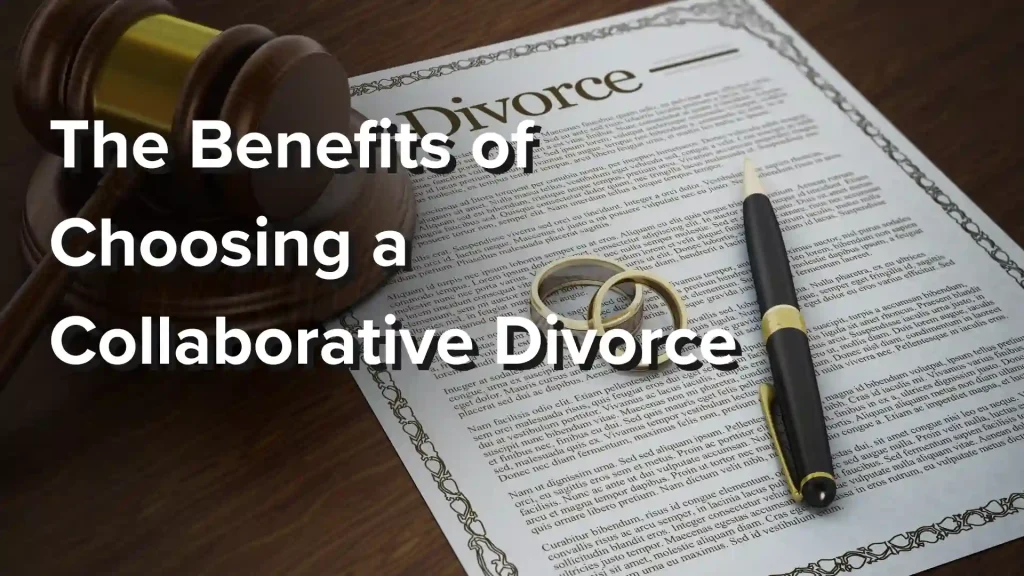
Divorce doesn’t have to feel like war. Not every split needs a winner and a loser. Some couples want to end their marriage with respect, privacy, and a sense of control. Collaborative divorce offers exactly that – a process built on cooperation rather than confrontation.
With the help of a divorce lawyer in Raleigh, many couples resolve their differences without ever stepping into a courtroom. Working with a financial planner during this time can help you make smart decisions about dividing assets. This approach lowers stress, keeps decisions in your hands, and often leads to more peaceful outcomes for everyone involved, including children, extended family, and even future co-parenting dynamics. In many cases, mental health professionals can also play a valuable role in supporting families through the emotional challenges of the process.
What Is Collaborative Divorce?
Collaborative divorce is a legal process where spouses agree to work together, not against each other. Each person hires their attorney, and all parties commit to resolving issues without court intervention.
Unlike traditional divorce, the collaborative model relies on open communication, honesty, and mutual respect. Everyone signs a participation agreement. If the process breaks down and someone decides to go to court, both attorneys must withdraw.
This creates a strong motivation to reach a workable, respectful settlement. And when children are involved, it allows parents to stay focused on cooperation rather than conflict.
How Collaborative Divorce Works
The collaborative process begins with both spouses agreeing to avoid court. Each person hires a collaborative divorce attorney trained in negotiation and cooperative law.
Everyone signs an agreement that includes:
- A promise to be honest and transparent
- A shared goal to settle without litigation
- An understanding that both attorneys must withdraw if talks break down
The couple and their team – attorneys and sometimes specialists like financial advisors or child experts – meet regularly to sort out every part of the separation:
- Division of property and debts
- Custody and parenting schedules
- Child and spousal support
After reaching an agreement, the attorneys draft a settlement and submit it to the court for approval.
Benefits of Collaborative Divorce
Collaborative divorce gives couples a more thoughtful, less aggressive way to separate. When both people commit to cooperation, they open the door to benefits that traditional litigation often can’t match:
- You Stay in Control – No surprises from a judge’s ruling. You and your spouse make the decisions.
- Less Fighting – The process steers conversations away from blame and toward solutions.
- More Privacy – No public court records or hearings. Everything stays in a confidential setting.
- Faster Timelines – Couples often finalize their agreement sooner without court scheduling delays.
- Lower Overall Cost – Collaborative divorce often avoids the financial spiral of drawn-out court battles.
- Better Parenting Outcomes – Parents who work through a non-litigated divorce process often cooperate better in the long term.
- Built-in Support – The process includes access to financial specialists, child experts, and coaches who help reduce stress and keep things moving forward.
These benefits don’t just make divorce easier – they create a stronger foundation for life after divorce.
Collaborative Divorce vs. Mediation
Both collaborative divorce and mediation avoid court, but they aren’t the same. Mediation involves a neutral third party who guides both spouses toward an agreement. No one gives legal advice during mediation.
In a collaborative divorce, each spouse has a lawyer advocating for their interests while committing to an amicable process. Collaborative divorce allows for deeper legal guidance while preserving the spirit of cooperation.
Some couples use mediation when their relationship remains highly respectful and open. Others prefer collaborative divorce when emotions run higher, but both people still want to avoid litigation.
Please read more about how to file for divorce here: How to File for Divorce in North Carolina.
Child-Focused Divorce Solutions
Collaborative divorce helps parents avoid court battles and create flexible, realistic parenting plans. Instead of leaving decisions to a judge, parents stay involved in shaping what works best for their family.
This approach protects children by:
- Keeping them out of court
- Reducing exposure to conflict
- Allowing both parents to stay involved
- Using neutral child specialists to guide parenting plans
- Modeling cooperation and stability
With proper support, parents can walk away with a plan that supports their children’s emotional and developmental needs, not just a legal checklist.
Cost of Collaborative Divorce
Collaborative divorce often costs less than traditional litigation. It removes many of the steps that drive up legal fees: formal discovery, multiple motions, hearings, and court prep.
While each spouse still pays for a lawyer and any involved specialists, the process tends to move more efficiently. Fewer delays and less time in court often translate to lower costs. Couples also avoid the emotional toll that usually comes with contested hearings, which can indirectly reduce missed work or therapy expenses.
That said, collaborative divorce requires commitment, especially to children. If one spouse backs out midway through the process, both sides must start over with new attorneys, which increases costs.
For couples who stay focused on cooperation, though, the savings can be significant, not just financially, but emotionally as well.
Why Collaborative Divorce Works
 Collaborative divorce works because it centers the process on people’s goals: protecting kids, securing finances, and moving on with dignity. The focus shifts from conflict to cooperation. When both spouses work toward fair outcomes instead of trying to win, they usually make better decisions for the long term.
Collaborative divorce works because it centers the process on people’s goals: protecting kids, securing finances, and moving on with dignity. The focus shifts from conflict to cooperation. When both spouses work toward fair outcomes instead of trying to win, they usually make better decisions for the long term.
This method also encourages real problem-solving. Instead of relying on a judge to make calls, couples think through what matters most—retirement accounts, parenting schedules and strategies, and even how to share holidays. That kind of detailed planning leads to fewer misunderstandings later.
Collaborative law gives people a space to speak openly, plan thoroughly, and preserve dignity on both sides. Collaborative divorce offers a clear path forward for couples who want an amicable divorce agreement and value control, privacy, and long-term peace of mind.
Talk to a Divorce Lawyer in Raleigh
At Marshall & Taylor PLLC, we help couples find the proper legal process for their goals, families, and futures. Our approach starts with listening—understanding your priorities, concerns, and how you want to move forward. We know every marriage and divorce carries its own set of challenges.
Our attorneys have helped many families reach resolutions that avoid the pain of a drawn-out courtroom battle. When collaborative divorce makes sense, we walk with you and help you through each step with clarity and compassion. And when it doesn’t, we’re ready to protect your interests another way.
If you want to separate with less stress, more control, and a greater focus on your family, talk with a divorce lawyer in Raleigh who can guide you through the collaborative process. Contact us today at (919) 833-1040 to learn more about your options.
